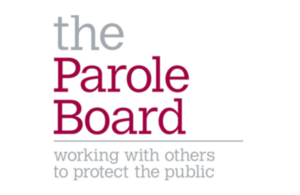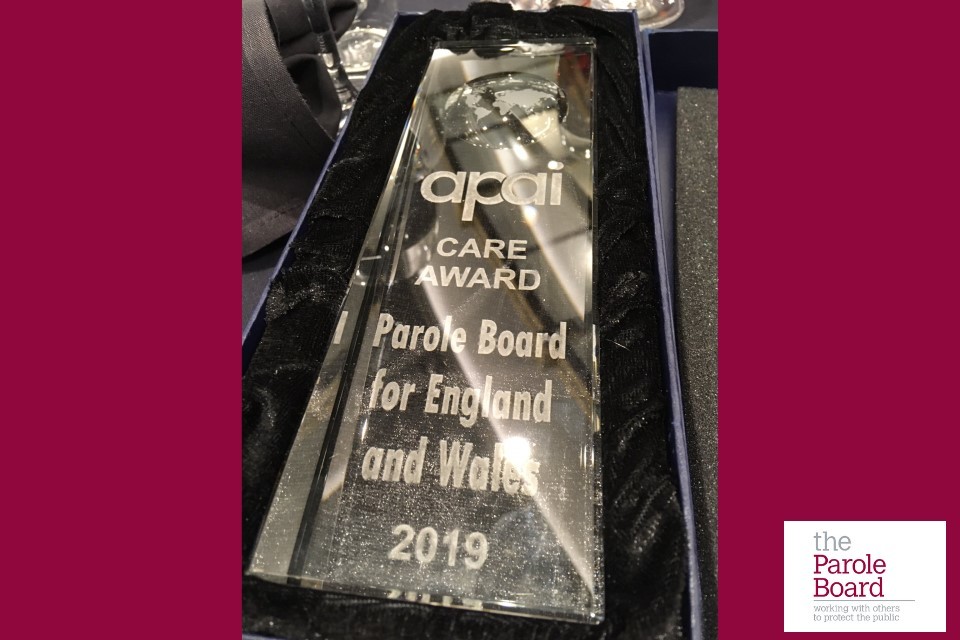Parole Board Chief Executive's Blog - 7th edition - April 2019
In his latest blog, Martin Jones, CEO, writes about meeting other paroling authorities in the US, publishing a new video for victims, plans for the new financial year, and guidance for members on consideration of allegations.

pb gov logo
International paroling authorities’ conference
I was delighted to be invited to attend a conference of international parole authorities in Baltimore, USA. This was a fantastic opportunity to hear about how parole works in New Zealand, Canada, South Africa and different US states. While each jurisdiction is different, there is a great deal of commonality.
The Association of Paroling Authorities International’s conference included sessions on how victims are treated, the increasing importance of using desistance theory when reviewing risk, and hearing from prisoners who have been through parole.

APAI award
At the end of the conference I was surprised and honoured that the Parole Board had been awarded the CARE award for improving victim and public understanding of the parole process through providing decision summaries and producing better public information. I do think this is an area where our hard work has yielded some real improvements.
A victim’s guide to parole
Linking nicely to our commitment to improve the information available for victims, the Board has published “A victim’s guide to parole.” This video is made for victims to help show what they can expect during the different stages of the parole journey. It was made in collaboration with the Victims’ Commissioner (who also provides the voice-over) and professionals who support victims during the parole process.
Priorities for the new financial year
Looking ahead to the new financial year I wanted to highlight some priorities:
BAME representation
I am really hopeful that our most recent recruitment campaign will increase BAME representation in our membership. The early signs are positive. Our outreach work ensured that we received more than double the number of applications we were expecting. 27% of those applications were from a BAME background and it is looking like a high proportion will be invited to interview. Having a more diverse membership is important for confidence in the parole system and it is vital that we build on this promise in all future programmes.
10,000 oral hearings
The number of cases that need a parole hearing remains extremely high. I now anticipate that the Board will need to list around 10,000 oral hearings this financial year to keep up with demand. This is essential to ensure hearings are held in a timely fashion.
Decision making framework
To be more transparent about how the Board makes parole decisions, we will be publishing a decision making framework for members that will provide a clear, structured document to assist them when they are reviewing parole cases.
More cases completed
We will be rolling out a project to our membership in a determined effort to reduce unnecessary deferrals. In its pilot phase, ‘Project Compass’ showed a dramatic reduction in the number of deferrals that happen on the day of a hearing, from over 20% to around 6%.
Deferrals on the day of a hearing cause anxiety and frustration for prisoners and victims, and are also the most wasteful for the Board. I am happy to see the introduction of Project Compass and am confident this will have a positive effect on the ‘on the day’ deferral rate and deferrals in general.
I am also hopeful that more can be done within the system to drive up earlier case completion.
Performance
A new set of Key Performance Indicators (KPIs) have been agreed and will be published in the Parole Board’s Business Plan (2019/20). These KPIs will seek to ensure that the right outcomes are measured and incentivised.
Our indicators are focused on: timeliness of hearings and decisions, ensuring hearings go ahead and are effective, and continuing to improve confidence and transparency in the parole process.
Guidance for members on consideration of allegations
Earlier this month we published guidance for our members on the consideration of allegations made against a prisoner.
This guidance was a key part of our strategic commitment to equip our members with further guidance and support to fairly handle cases where there are allegations of offending that someone has not been convicted for. We worked with judges and lawyers to get the right balance so that we continue to have fair hearings, while acting on recommendations made for the Board to improve certain aspects of its work.
It is worth saying that we do listen and have consistently made improvements over the past year, including: the introduction of decision summaries, refresher training to all of our members and vastly improving the information available to victims.
That said, we are not sitting still. The work to deliver a more effective and transparent system continues.
For example, we are preparing to implement a reconsideration mechanism — where victims and prisoners will be able to make a request for parole decisions to be reviewed — following recommendations made by the MoJ review